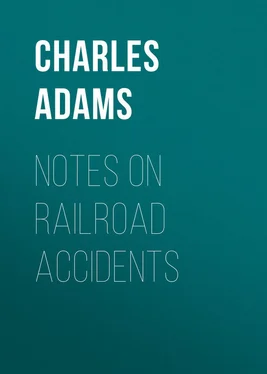Charles Adams - Notes on Railroad Accidents
Здесь есть возможность читать онлайн «Charles Adams - Notes on Railroad Accidents» — ознакомительный отрывок электронной книги совершенно бесплатно, а после прочтения отрывка купить полную версию. В некоторых случаях можно слушать аудио, скачать через торрент в формате fb2 и присутствует краткое содержание. Жанр: foreign_antique, foreign_prose, на английском языке. Описание произведения, (предисловие) а так же отзывы посетителей доступны на портале библиотеки ЛибКат.
- Название:Notes on Railroad Accidents
- Автор:
- Жанр:
- Год:неизвестен
- ISBN:нет данных
- Рейтинг книги:4 / 5. Голосов: 1
-
Избранное:Добавить в избранное
- Отзывы:
-
Ваша оценка:
- 80
- 1
- 2
- 3
- 4
- 5
Notes on Railroad Accidents: краткое содержание, описание и аннотация
Предлагаем к чтению аннотацию, описание, краткое содержание или предисловие (зависит от того, что написал сам автор книги «Notes on Railroad Accidents»). Если вы не нашли необходимую информацию о книге — напишите в комментариях, мы постараемся отыскать её.
Notes on Railroad Accidents — читать онлайн ознакомительный отрывок
Ниже представлен текст книги, разбитый по страницам. Система сохранения места последней прочитанной страницы, позволяет с удобством читать онлайн бесплатно книгу «Notes on Railroad Accidents», без необходимости каждый раз заново искать на чём Вы остановились. Поставьте закладку, и сможете в любой момент перейти на страницу, на которой закончили чтение.
Интервал:
Закладка:
About a year later, in December, 1865, a similar case occurred which, however, had in it strong elements of the ludicrous. A clergyman, laboring under great indignation and excitement, and without the slightest sense of the ridiculous, recounted his experience in a communication to the Times . He had found himself alone in a compartment of an express train in which were also a young lady and a man, both total strangers to him. Shortly after the train started the man began to give unmistakable indications of something wrong. He made no attempt at any violence on either of his fellow passengers, but he was noisy, and presently he proceeded to disrobe himself and otherwise to indulge in antics which were even more indecent than they were extraordinary. The poor clergyman, – a respected incumbent of the established church returning to the bosom of his family, – was in a most distressing situation. At first he attempted remonstrance. This, however, proved worse than unavailing, and there was nothing for it but to have recourse to his umbrella, behind the sheltering cover of which he protected the modesty of the young lady, while over its edges he himself from time to time effected observations through an apparently interminable journey of forty and more miles.
These and numerous other cases of fires, murders, assaults and indecencies had occurred and filled the columns of the newspapers, without producing the slightest effect on the managers of the railway companies. No attention was paid by them to the Board of Trade circulars. At last Parliament took the matter up and in 1868 an act was passed, making compulsory some "efficient means of communication between the passenger and the servants of the company in charge" of railroad trains. Yet when six years later in 1874 the Shipton accident occurred, and was thought to be in some degree attributable to the absence of the very means of communication thus made compulsory, it appeared, as has been seen, that the associated general managers did not yet consider any such means of communication either required or likely to be useful.
Meanwhile, as if in ironical comment on such measured utterances, occurrences like the following, which took place as recently as the early part of 1878, from time to time still meet the eye in the columns of the English press: —
"A burglar was being taken in a third-class carriage from London to Sheffield. When about twelve miles from Sheffield he asked that the windows might be opened. This was no sooner done than he took a dive out through the aperture. One of the warders succeeded in catching him by a foot, and for two miles he hung head downward suspended by one foot and making terrific struggles to free himself. In vain he wriggled, for although his captors were unable to catch the other foot, both held him as in a vise. But he wore spring-sided boots, and the one on which his fate seemingly depended came off. The burglar fell heavily on the foot-board of the carriage and rolled off on the railway. Three miles further on the train stopped, and the warders went back to the scene of the escape. Here they found him in the snow bleeding from a wound on the head. During the time he was struggling with the warders the warder who had one hand free and the passengers of the other compartments who were witnessing the scene from the windows of the train were indefatigable in their efforts to attract the attention of the guards by means of the communication cord, but with no result. For two miles the unfortunate man hung head downward, and for three miles further the train ran until it stopped at an ordinary resting place."
A single further example will more than sufficiently illustrate this instance of British railroad conservatism, and indicate the tremendous nature of the pressure which has been required to even partially force the American bell-cord into use in that country. One day, in the latter part of 1876, a Mr. A. J. Ellis of Liverpool had occasion to go to Chester. On his way there he had an experience with a lunatic, which he subsequently recounted before a magistrate as follows: —
"On Friday last I took the 10.35 A.M., train from Lime Street in a third-class carriage, my destination being Chester. At Edge Hill Station the prisoner and another man, whom I afterward understood to be the prisoner's father, got into the same compartment, no one else being in the same compartment. The other person was much under the influence of drink when he entered, and was very noisy during the journey. The prisoner had the appearance of having been drinking, but was quiet. I sat with my back to the engine, on the getting-out side of the carriage; prisoner was sitting on the opposite side, with his right arm to the window, and the other person was sitting on the same side as prisoner, about the middle of the seat. I was engaged reading, and did not exchange words with the prisoner.
"After we had passed over Runcorn bridge and through the station, I perceived the prisoner make a start, and looking toward him saw a white-hafted knife in his hand, about five inches long, with the blade open. He held it in his right hand in a menacing manner. Drawing his left hand along the edge of the blade, he said, "This will have to go into some – ." At that moment he looked at me across the carriage; he was on his feet in an instant, and looking across to me, he said, "You – , this will have to go into you," and made a bound toward me. The other jumped up and tried to prevent him. The prisoner threw him away; he made a plunge at my throat. I caught his wrist just as he advanced, and struggled with him, still holding fast to his wrist with both hands. We fell over and under one another two or three times, and eventually he overpowered me. I had fallen on my side on the seat, but still retained my hold upon his wrist. While lying in that position he held the knife down to within an inch of my throat. I called to the other man to hold the prisoner's hand back which contained the knife, and by that means he saved my life. I was growing powerless, and as the other man restrained the prisoner from using the knife, I jerked myself from his grasp, and knocked the knife out of the prisoner's hand with my left hand.
"The prisoner eluded the grip of his father, and falling on his knees began to seek for his knife. Failing to find the knife, he was instantly on his feet, and made a spring upon me. If I recollect aright, he threw his arms around my neck, and in this manner we struggled together up and down the carriage for some minutes, during which time he got my left thumb (with a glove on at the time) in his mouth, and bit it. Still retaining my thumb in his mouth, the other man struck him under the chin, when he released it, and fell on his knees seeking the knife, which he did not find. He was immediately on his feet, and again made a spring upon me. We had then a very long and desperate struggle, when he overpowered me and pinned me in a corner of the compartment. At last he got my right thumb into his mouth, holding my hand to steady it with both his hands while he bit it. With a great effort he then bit my thumb off, clean to the bone. I had no glove on that hand. I called to the other man to help me, but he seemed stupefied. He called two or three times to the prisoner, 'Leave the poor man alone. The poor man has done thee no harm.' Though sitting within nine inches of my knees he rendered me no help.
"When the prisoner bit my thumb off, he held it in his mouth; he pushed his head through the glass, spat the thumb into his hand and flung it out through the window. I then stood up and put my left hand in my pocket, took out my purse and cried out: 'If it is money you want take all I have.' He made a grab at the purse and flung it through the window, on the same side as the thumb was thrown out. From this act I inferred that I was struggling with a maniac. I retreated to the other end of the compartment, holding the other man between me and the prisoner, but he passed the other man by jumping over the seat and again got hold of me. Then he forced his head through the other window, breaking the glass, and, loosing me for a moment, with his fists smashed the remaining glass in the window. Addressing me he said: 'You – , you will have to go over;' at the same time he flung both his arms around my waist. I put my leg behind his and threw him on his back. I called upon the other man to help me and he did so.
Читать дальшеИнтервал:
Закладка:
Похожие книги на «Notes on Railroad Accidents»
Представляем Вашему вниманию похожие книги на «Notes on Railroad Accidents» списком для выбора. Мы отобрали схожую по названию и смыслу литературу в надежде предоставить читателям больше вариантов отыскать новые, интересные, ещё непрочитанные произведения.
Обсуждение, отзывы о книге «Notes on Railroad Accidents» и просто собственные мнения читателей. Оставьте ваши комментарии, напишите, что Вы думаете о произведении, его смысле или главных героях. Укажите что конкретно понравилось, а что нет, и почему Вы так считаете.












